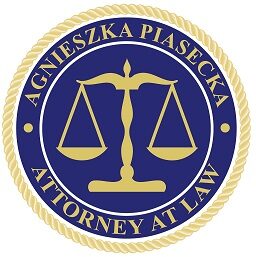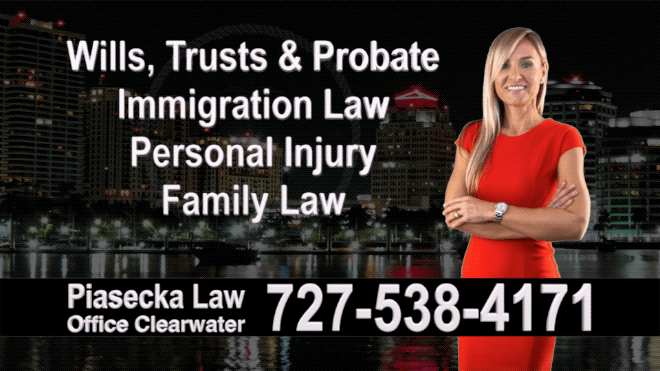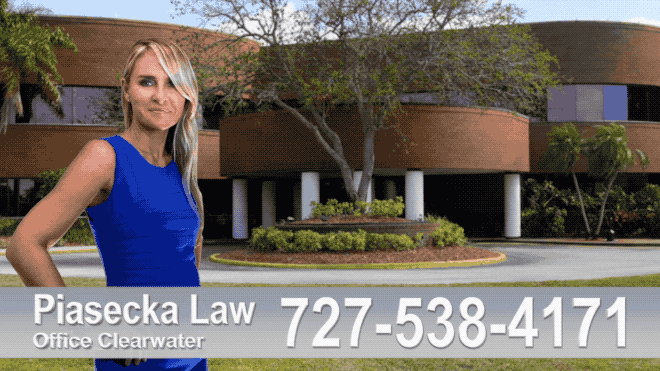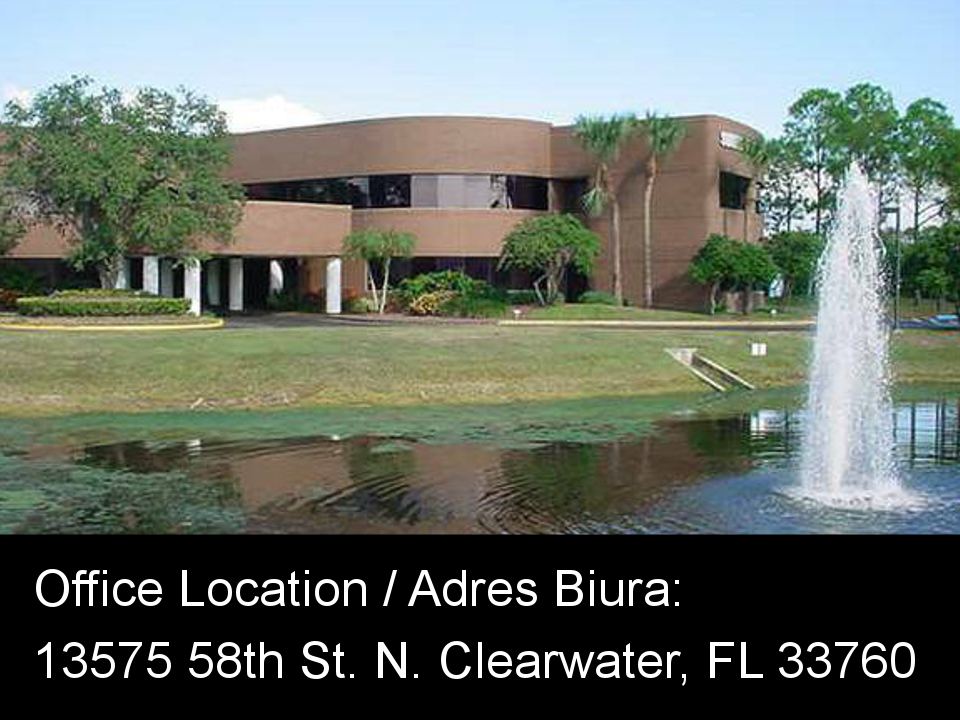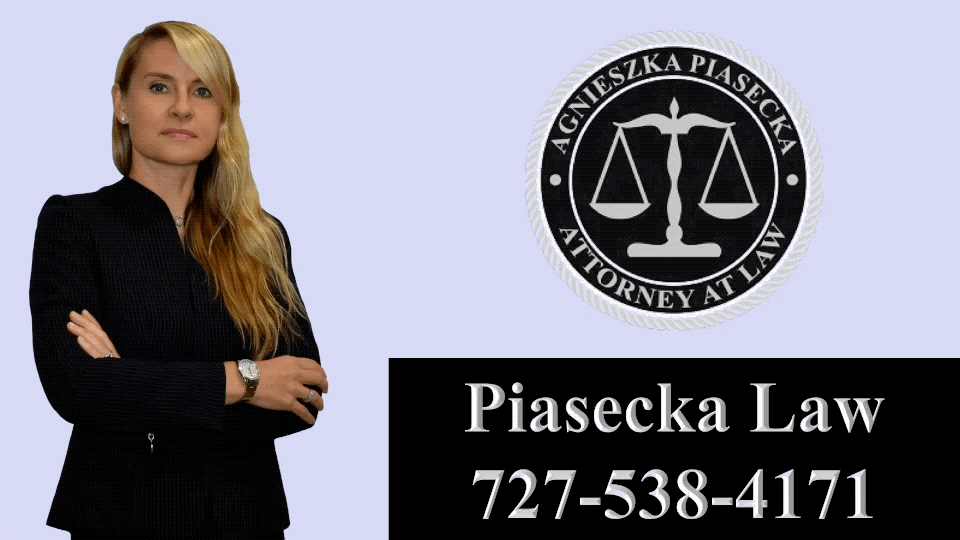Agnieszka Piasecka Law – Polish Attorney near New Port Richey, Florida
813-786-3911
727-538-4171
Agnieszka “Aga” Piasecka, Esq. is a general practice Polish attorney / lawyer in Florida and in Poland. Agnieszka has two Law Degrees and more than 20 years of combined experience from Poland and USA. Attorney Agnieszka Piasecka obtained her Juris Doctorate Cum Laude from Stetson University College of Law in Florida and her Masters Degree in Law with Honors from Jagiellonian University in Poland. She also studied International Law in Tilburg, Holland. Polish Attorney Agnieszka Piasecka is fluent in Polish, English and Italian and can assist you with your legal needs in Florida and Poland.
Agnieszka Piasecka Law – Polski Adwokat blisko New Port Richey, Floryda
813-786-3911
727-538-4171
Adwokat Agnieszka “Aga” Piasecka jest polskim prawnikiem uprawnionym do praktyki prawa na Florydzie i w Polsce. Agnieszka Piasecka posiada dwa dyplomy prawa i ma łącznie ponad 20 lat doświadczenia prawniczego z Polski i USA. Agnieszka uzyskała Doktorat Prawa z wyróżnieniem w Stetson University College of Law na Florydzie oraz Magistrat Prawa z wyróżnieniem na Uniwersytecie Jagiellońskim w Polsce. Agnieszka Piasecka studiowała również Prawo Międzynarodowe na Uniwersytecie w Tilburgu, w Holandii. Agnieszka mówi biegle po polsku, po angielsku oraz po włosku.
Aby umówić się na pierwszą bezpłatną konsultację zadzwoń:
727-538-4171
813-786-3911
Polish Attorney near New Port Richey, Florida, Agnieszka Piasecka’s, areas of practice include: / Polski Adwokat, Agnieszka Piasecka, zajmuje się między innymi następującymi sprawami:
- Wills and Trusts / Estate Planning / Testamenty i Trusty
- Living Wills / Testamenty dotyczące decyzji medycznych
- Real Estate Law / Prawo Nieruchomości
- Family Law / Divorce / Adoptions / Prawo Rodzinne/Rozwody/Adopcje
- Immigration Law / Prawo Imigracyjne
- Personal Injury Law / Wypadki drogowe/Odszkodowania
- Traffic Violations / Traffic Tickets / Mandaty drogowe
- Business Entities Formation / Zakładanie firm i korporacji
- Contracts / Kontrakty
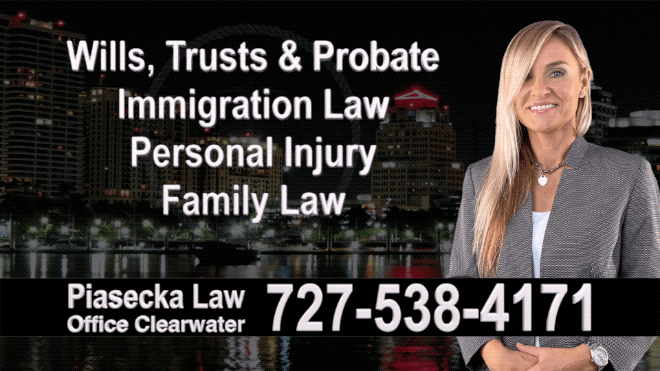
Agnieszka Piasecka Law – Polish Lawyer near New Port Richey, Florida
813-786-3911
727-538-4171
Agnieszka Piasecka’s Client Reviews
https://piaseckalaw.com/reviews
https://www.avvo.com/attorneys/33760-fl-agnieszka-piasecka-4581259/reviews.html
Po BEZPŁATNĄ pierwszą konsultację zadzwoń na / To schedule your first FREE consultation call:
813-786-3911
727-538-4171
Polish Lawyer Agnieszka Piasecka Serving New Port Richey
727-538-4171
813-786-3911
Serving New Port Richey by appointment only.
Agnieszka Piasecka Polski Adwokat New Port Richey
727-538-4171
813-786-3911
Aga offers flat rates on creation of Trusts and Wills, and Powers of Attorney. For a FREE CONSULTATION, call Aga at:
727-538-4171
813-786-3911
Agnieszka “Aga” Piasecka, Esq. has experience with Estate Planning and Probate Law and can assist you with:
- Probate
Probate is a court-supervised legal process, through which the assets of a deceased person are identified and distributed to the heirs or beneficiaries under a will or, if there is no will, pursuant to Florida probate law. A will typically appoints a personal representative to administer the estate. If the deceased left no will and there are assets to be probated, the estate of the decedent must be distributed pursuant to probate law.
Generally, the decedent’s assets are identified and gathered and they are first used to pay the costs of probate proceedings, then to pay the decedent’s debts, and the remainder is distributed to the decedent’s beneficiaries.
There are two types of probate proceedings in Florida:
1. A “Formal Administration” is filed when there are assets exceeding $ 75,000 and/or when it is necessary to appoint a representative to administer the estate.
2. A “Summary Administration” is filed when the value of the entire estate subject to probate administration does not exceed $ 75,000 and the appointment of a personal representative is not necessary.
There is also a non-court supervised administration proceeding called “Disposition of Personal Property Without Administration”. This type of probate administration applies only to limited circumstances and may be filed via informal petition to request release of the decedent’s assets to reimburse the person who paid the final expenses such as e.g. funeral costs, medical bills etc.
Probate proceedings may be lengthy and very expensive. The duration of legal proceedings depends on many factors but in general it may take from a few months up to a few years to administer one’s estate. During this time the decedent’s assets remain “locked” in the court proceedings and unavailable to heirs and/or beneficiaries. The typical costs of probate proceedings may be as high as several percent of the estate’s value. Moreover, probate proceedings are public record, which means there is no privacy assured when your estate goes through probate. Therefore, it is important to plan ahead in order to avoid probate whenever possible.
- Last Will and Testament
A “last will”, also called “testament” is a written legal instrument, in which a person disposes of his or her property after death. Under Florida law, in order to be valid, a will must fulfill certain legal requirements. Wills must be validate by probate court in probate proceedings. After one’s death, a will must be admitted to probate court and go through probate proceedings. The custodian of the deceased’s original will, must file the will with the Clerk of the Court in the county where the decedent was domiciled, within 10 days after learning the person is deceased.
A will typically appoints a person to administer the deceased’s estate, so-called personal representative. If no personal representative has been named, it may be necessary for an attorney to file a petition with a court on behalf of the heirs, beneficiaries and other interested parties to a appoint a personal representative. Florida rules of law govern, who can become a personal representative and how will she or he be compensated.
- Living Wills
A “living will” is a written legal instrument stating a person’s desires regarding his or her medical treatment and/or end-of-life medical care in case of serious illness when they are no longer able to express informed consent and communicate their decisions to physicians and medical personnel. It is also called a “health care directive” or “advance directive”. A “living will” is different than a regular will, in which a person expresses their desires regarding distribution of their assets after death. Unlike a will, a “living will” has no power after one’s death.
A “living will” is a very important document, which can give doctors and family members invaluable guidance with making critical decisions as to a choice of medical treatment when a person becomes seriously ill and can no longer give informed consent and communicate their preferences.
- Health Care Directive
A “health care directive” also called “advance directive” to physicians is another name for a “living will”, in which a person states his or her desires regarding medical treatment preferences in case of serious illness, when they are no longer able to give informed consent and communicate their wishes.
- Advance Directive
An “advance directive” is another term for a “living will” or “advance directive”, which is a written legal instrument, in which a person states his or her desires and preferences regarding medical treatment in case of serious illness, when they are no longer able to give informed consent and communicate their decisions.
- Trusts
A “trust” is a legal arrangement regarding property, in which the creator of the trust (called Settlor) transfers ownership of assets into care of another person (called Trustee), who holds legal title to property of the settlor with equitable duties to administer it for the benefit of a third person (called Beneficiary). A settlor can be the same person as trustee and there can be more than one beneficiary of the trust. In order to form a valid trust, one must meet certain legal requirements. The document that establishes the responsibilities of the trustee and the rights of the beneficiaries is called the “trust”, “trust instrument” or “trust agreement”.
The main advantage of creating a trust (as opposed to a will) is to avoid probate proceedings and spare your beneficiaries the expense and delay of probate court proceedings after your death. Certain trusts can be also used for asset protection against creditors.
There are many different types of trusts including:
1. Living trusts
A living trust, also called inter vivos trust is created during the settlor’s lifetime . Living trusts can be either revocable or irrevocable.
a. Revocable trusts
The settlor remains in control and ownership of his or her assets and can be changed and terminated at any time. This type of trust does not provide protection against creditors but it is an excellent tool to dispose of your property after death by avoiding probate proceedings.
Once assets are transferred into the trust, they belong to the trust itself, and remain subject to the rules and instructions set up in the trust instrument. The trustee has a fiduciary duty to administer the trust funds accordingly for the benefit of trust beneficiaries. At settlors death, the trust assets pass directly to the beneficiaries and avoid probate proceedings.
b. Irrevocable trusts
Once the irrevocable trust is created, the settlor can no longer control trust assets, modify, change or revoke the trust instrument. Once a property is transferred to the irrevocable trust, no one, including the settlor, can remove the property out of the trust. Generally, this type of trust provides protection against creditors and assures that upon your death, your assets are passed to trust beneficiaries and not to your creditors. However, a court can sometimes invalidate an irrevocable trust if it finds that the trust was established with the intention of defrauding creditors. Therefore, it is important to plan for asset protection well before you even anticipate to be subject to any creditor claims.
2. Testamentary trusts
A testamentary trust, also called a “will trust” or a “trust under will” is set up in a will . A testamentary trust is established only after the settlor’s death, in which it differs from a living trust, which is created during the settlor’s lifetime.
3. Charitable trusts
A charitable trust is established with the intent to benefit a specific charity or general public rather than a private individual or entity. Charitable trusts are eligible for a favorable tax treatment and they are often established as part of an estate plan to lower or avoid imposition of estate and gift tax.
4. Spendthrift trusts
A spendthrift trust is created for the benefit of a person, who is often unable to manage money and control his or her spending and it gives a trustee an authority to make decisions as to how the trusts funds may be distributed and spent for the benefit of the beneficiary. Such a trust limits the beneficiary’s access to the trust funds and also provides protection against beneficiary’s creditors. The beneficiary is prohibited or restricted in assigning present or future income and/or principal in the trust to his or her creditors.
5. Discretionary trusts
A discretionary trust is a trust, in which a settlor has delegated nearly complete or limited discretion to the trustee to decide as to how the trust income and/or principal is distributed to beneficiaries.
6. Support trusts
A support trust is a discretionary trust, in which a trustee has discretion to pay the beneficiary as much income or principal as the trustee believes is needed for support or the beneficiary. The type of support can be determined by terms of trust e.g. “for comfortable support” or for “support in accordance with the beneficiary’s standard of living”. Such a trust provides the beneficiary with partial protection from creditors. The beneficiary’s interest cannot be voluntarily transferred or assigned and is unavailable to general creditors but creditors, who provide necessaries to the beneficiary can usually reach it.
7. Totten trusts
A totten trust, also called “POD (Payable Upon Death) Account” is a revocable trust created during the lifetime of the settlor by depositing his or her money into an account or financial institution, typically in a savings account, in the depositor’s name as trustee for another. An individual or an entity can be named as beneficiary. Upon the settlor’s death, the money passes directly to the beneficiary and avoids probate. A totten trust can be revoked at any time as the gift is not completed until the settlor’s death. A totten trust is commonly used to indicate a successor to the bank account without having to create a will.
8. Self-settled trusts
A self-settled trust is a type of trust, in which the settlor is also the beneficiary, i.e. the one, who receives benefits from the trust.
- Power of Attorney
Aga offers flat rates on preparation of powers of attorney. A power of attorney is a written legal instrument that gives someone authority to act on another person’s (principal) behalf and represent him or her in private affairs business, medical, or some other legal matters
- Medical Power of Attorney
Aga offers flat fees on preparation of medical powers of attorney. A medical power of attorney is a written legal instrument that allows you (principal) to appoint a person that will have authority to make medical decisions on your behalf in case you become unable to make them for yourself.
- Probate
Probate is a legal process, through which the assets of a deceased person are distributed to the heirs or beneficiaries under court’s supervision. All wills must be validated through probate proceedings. If there was no will, the assets are distributed through legal proceedings pursuant to Florida probate law. If you are a hair or beneficiary , have been appointed a personal representative in someone’s will or otherwise may have interest in the decedent’s assets, Aga can effectively represent you in probate court.
